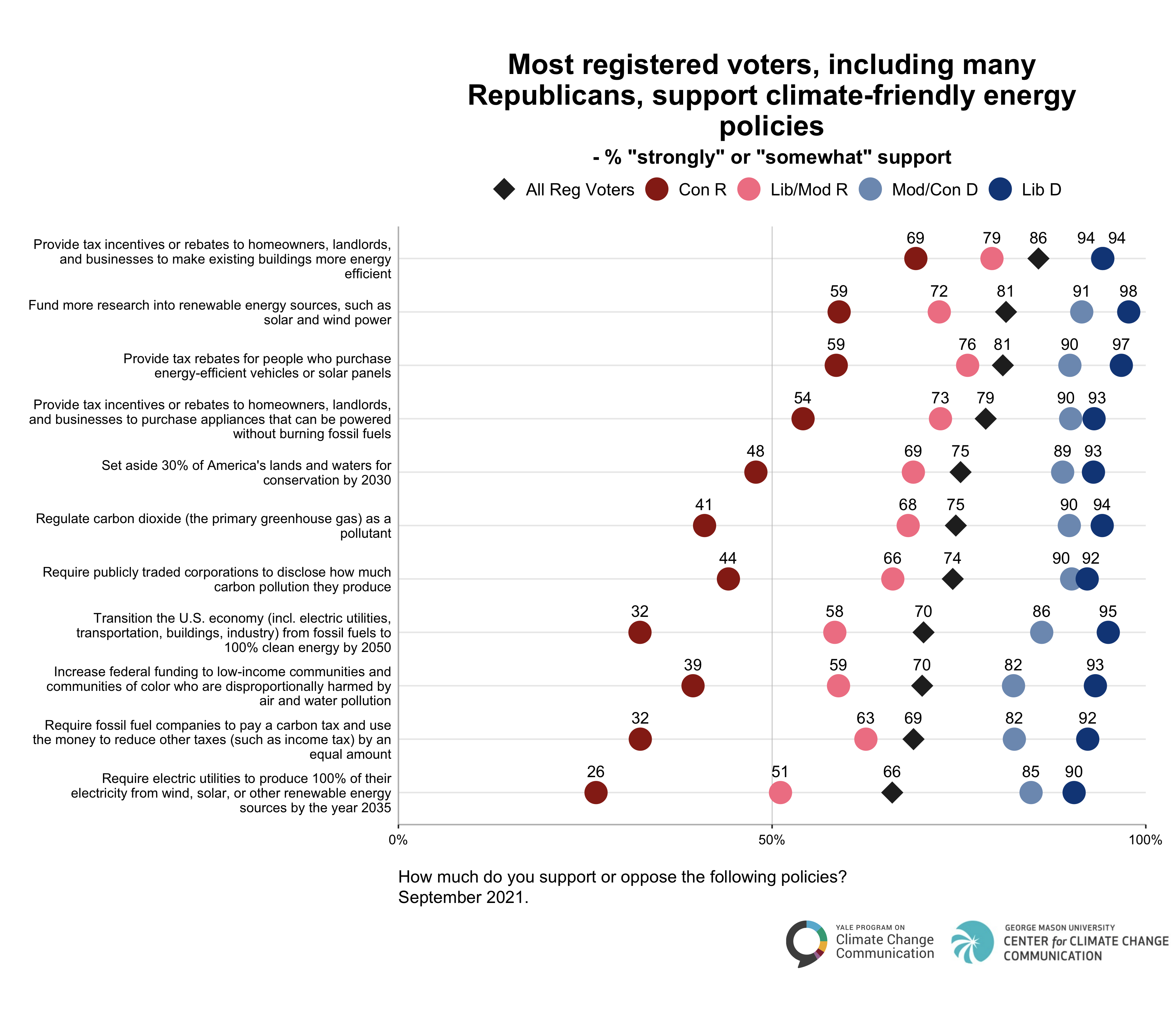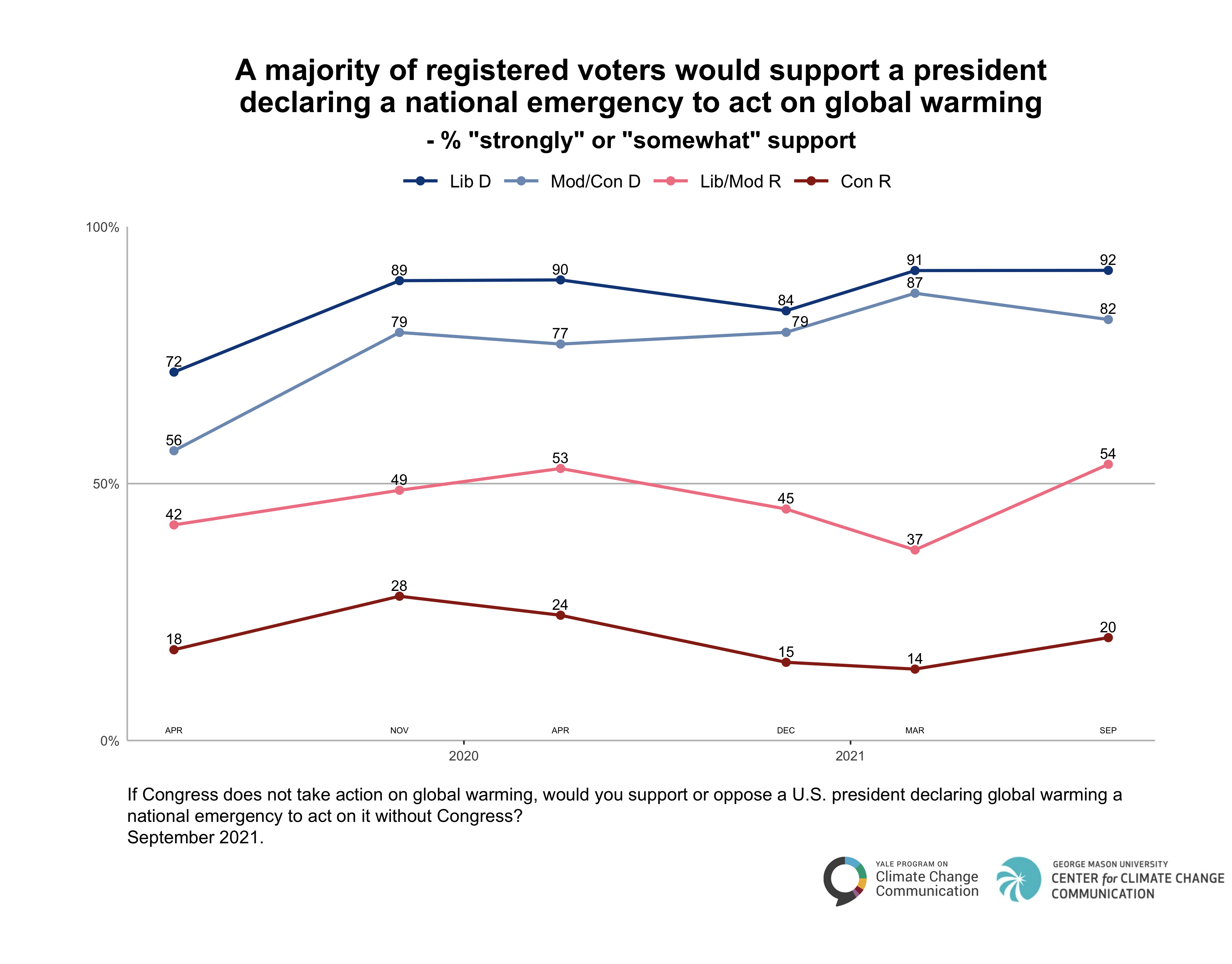Report · Oct 20, 2021
Politics & Global Warming, September 2021
By Anthony Leiserowitz, Edward Maibach, Seth Rosenthal, John Kotcher, Jennifer Carman, Liz Neyens, Matthew Goldberg, Karine Lacroix and Jennifer Marlon
Filed under: Policy & Politics and Behaviors & Actions
2. Support for Policies to Reduce the Pollution that Causes Global Warming
2.1. Most registered voters, including many Republicans, support climate-friendly energy policies.
Registered voters across the political spectrum support many energy policies designed to reduce carbon pollution and fossil fuel dependence and promote clean energy, including:
- Providing tax incentives or rebates to homeowners, landlords, and businesses to make existing buildings more energy efficient: 86% of registered voters, 94% of both liberal Democrats and moderate/conservative Democrats, 79% of liberal/moderate Republicans, and 69% of conservative Republicans.
- Funding more research into renewable energy sources: 81% of registered voters, 98% of liberal Democrats, 91% of moderate/conservative Democrats, 72% of liberal/moderate Republicans, and 59% of conservative Republicans.
- Providing tax rebates to people who purchase energy-efficient vehicles or solar panels: 81% of registered voters, 97% of liberal Democrats, 90% of moderate/conservative Democrats, 76% of liberal/moderate Republicans, and 59% of conservative Republicans.
- Providing tax incentives or rebates to homeowners, landlords, and businesses to purchase appliances that can be powered without burning fossil fuels (such as electric water heaters, electric heat pumps, and electric induction cooktops): 79% of registered voters, 93% of liberal Democrats, 90% of moderate/conservative Democrats, 73% of liberal/moderate Republicans, and 54% of conservative Republicans.
- Setting aside 30% of American’s lands and waters for conservation by 2030: 75% of registered voters, 93% of liberal Democrats, 89% of moderate/conservative Democrats, 69% of liberal/moderate Republicans, and 48% of conservative Republicans.
- Regulating carbon dioxide as a pollutant: 75% of registered voters, 94% of liberal Democrats, 90% of moderate/conservative Democrats, 68% of liberal/moderate Republicans, and 41% of conservative Republicans.
- Requiring publicly traded corporations to disclose how much carbon pollution they produce: 74% of registered voters, 92% of liberal Democrats, 90% of moderate/conservative Democrats, 66% of liberal/moderate Republicans, and 44% of conservative Republicans.
- Transitioning the U.S. economy (including electric utilities, transportation, buildings, and industry) from fossil fuels to 100% clean energy by 2050: 70% of registered voters, 95% of liberal Democrats, 86% of moderate/conservative Democrats, 58% of liberal/moderate Republicans, and 32% of conservative Republicans.
- Increasing federal funding to low-income communities and communities of color who are disproportionally harmed by air and water pollution: 70% of registered voters, 93% of liberal Democrats, 82% of moderate/conservative Democrats, 59% of liberal/moderate Republicans, and 39% of conservative Republicans.
- Requiring fossil fuel companies to pay a tax on the carbon pollution they produce, and use that revenue to reduce other taxes (such as the federal income tax) by an equal amount i.e., a revenue-neutral carbon tax]: 69% of registered voters, 92% of liberal Democrats, 82% of moderate/conservative Democrats, 63% of liberal/moderate Republicans, and 32% of conservative Republicans.
- Requiring electric utilities to produce 100% of their electricity from renewable energy sources by the year 2035: 66% of registered voters, 90% of liberal Democrats, 85% of moderate/conservative Democrats, 51% of liberal/moderate Republicans, and 26% of conservative Republicans.
2.2. A majority of registered voters would support a president declaring a national emergency to act on global warming.
More than six in ten registered voters (63%; see data tables) would “strongly” or “somewhat” would support a U.S. president declaring global warming a national emergency to act on it if Congress does not. This action has the support of large majorities of both liberal Democrats (92%, with 61% saying they “strongly support” it; see data tables) and moderate/conservative Democrats (82%), as well as majorities of Independents (57%) and liberal/moderate Republicans (54%). By contrast, one in five conservative Republicans (20%) would support it, while 79% of conservative Republicans would oppose it (including 62% who would “strongly oppose” it, see data tables).

